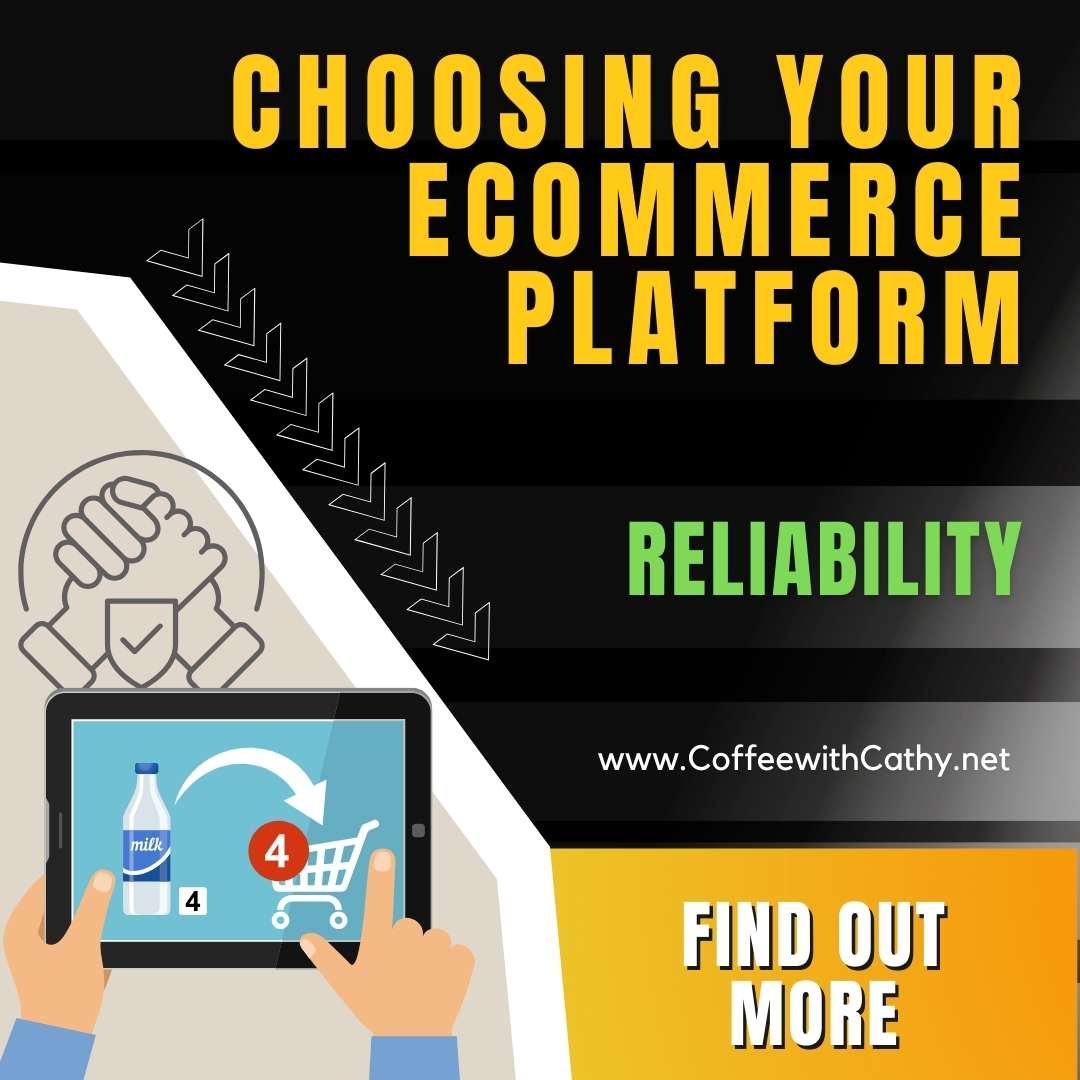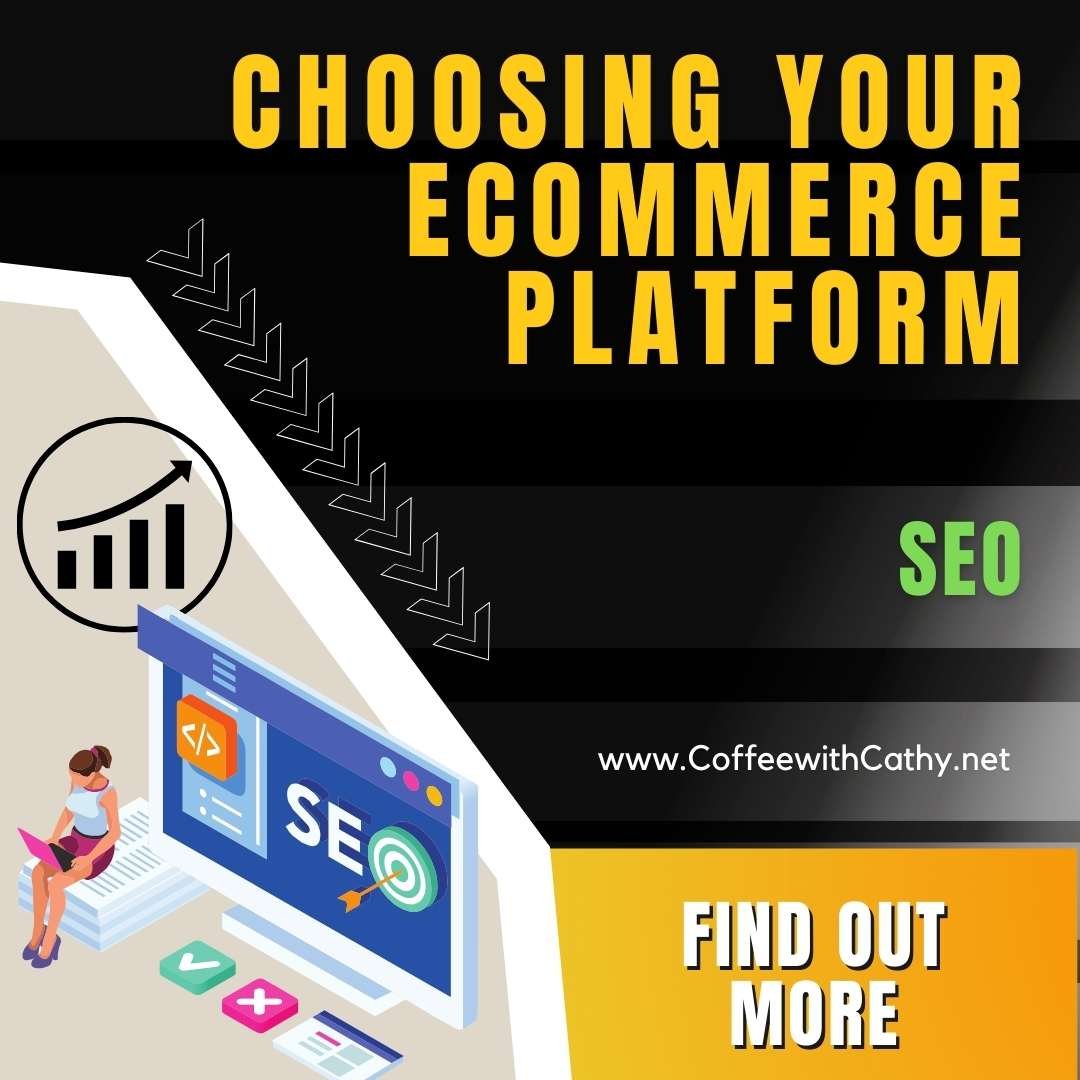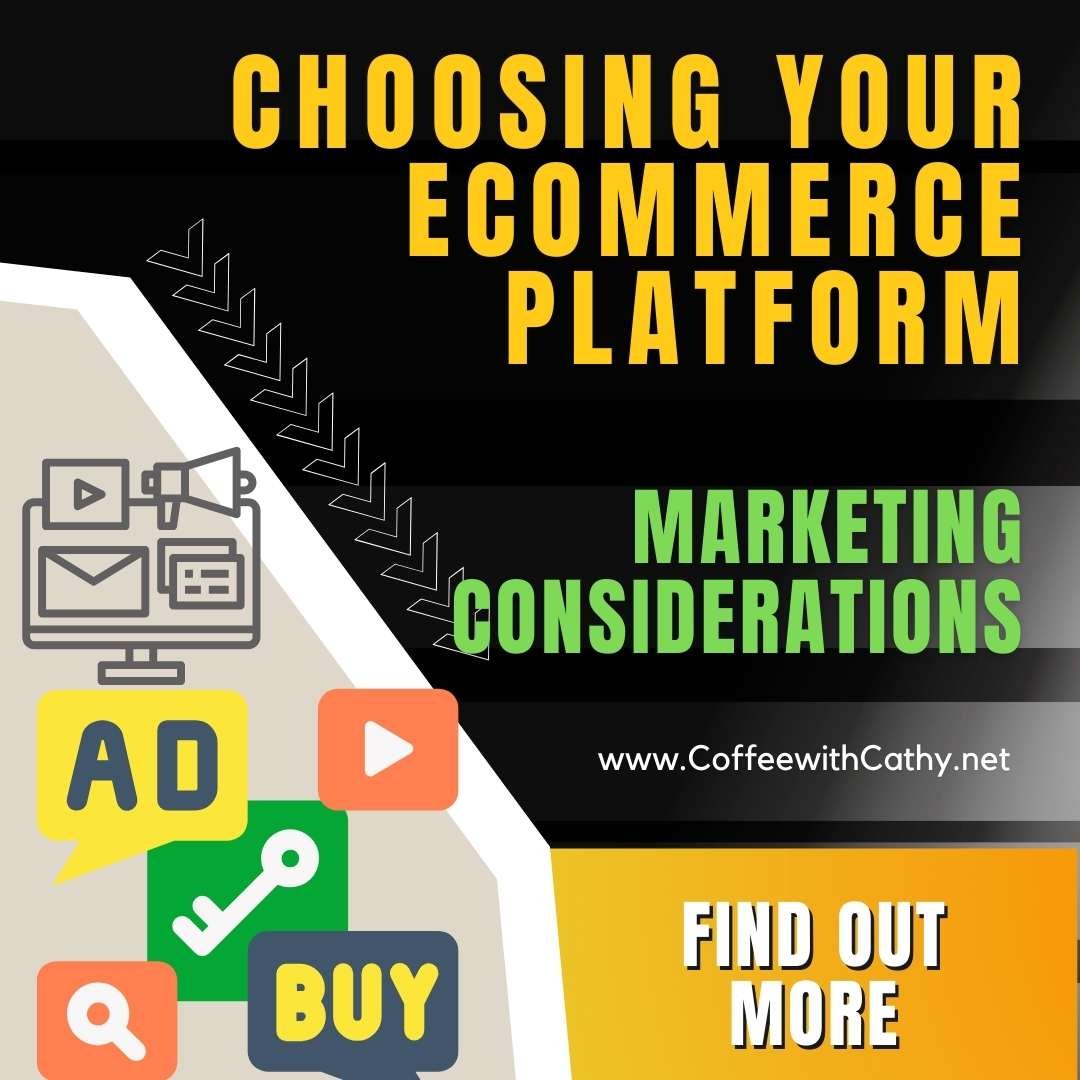Choosing the Best Ecommerce Platform for Your Business
This is an ultimate guide to help you understand general factors to consider when choosing an ecommerce platform. Some factors may be more important than others and it will ultimately depend on your business goals.
I aim for this ecommerce selection guide to give enough information in one go, without too much detail.
This is a lengthy page, but filled with short yet solid information. The categories are listed before, but first let’s take a look at the way we should consider an ecommerce platform.
First determine what you’ll need a platform to do and write them down. Will you need to hire an outside consultant or can this be down in-house?
Next, what is your budget. Of course, the less expensive the better for ROI, but that should not be the determining factor. If you aren’t sure, this is where an outside company might be helpful. Or you may even want to start off with a platform that gives you the basics than scale at a later point in time.
Then you’ll want to research the platforms that you are considering. There are many out there and many offer demos or trials to help you decide. As you are going through them, write down the pros and cons of each to help you select the right one.
As I talk about each section in more detail, you’ll see a button on the bottom of each section for more information.
What if you know you want an ecommerce website, but you are overall unsure?
There are some alternatives that you can do. You can create a quote only website. While this may not ideal, it is a start and is better than having an information only website. I go into further details here.
Important Factors to Consider when choosing the right ecommerce platform
These are functionalities to consider when selecting an ecommerce solution to help you choose the best one.
How Do I Know If An eCommerce Website Is Right For My Business?
It is impossible to compete online without an eCommerce platform. Think of this way, your website is a salesman that is available 24/7 all year round and doesn’t require days off. It is an extension of your business. It is 2024 and the reality is that if you don’t have a website, does your business even exist.
An eCommerce platform is the foundation of an online retail enterprise, whether it is for a B2B, B2C, or a mix of both.
The ideal eCommerce platform optimizes your interactions with vendors, customers, and employees by automating tasks and centralizing communication, saving time and money. Key considerations for adopting an eCommerce site include your customers’ propensity for online purchases, the affordability of setup and maintenance, and your capacity to manage the platform. If these factors align, an eCommerce website can significantly enhance your business growth.
Business Goals And Current State When Choosing Your eCommerce platform
Obviously, you want your business to grow, so lets make sure that all things are considered with the features that you need.
Before you start your search, there is current state of your business. Understand your business goals, functions, departments, roles, SOPs (Standard Operating Procedures), and so on in. Having knowledge at least on decent level will enhance them with an ecommerce platform since it compliments your existing systems.
Here are some examples of questions to get you started to think about your business goals:
- What back office software are you using for different areas of your business, like accounting, fulfillment, ordering, and purchasing?
- What are critical factors for you and your business?
- What are things that you could do without?
- Do you need to hire someone to help you, even if it’s on a short term?
- What are your future business goals to grow your business?
Keep in mind that there are different platforms and offer a variety of functionalities that others may not have. If your business goals are to expand and scale, then its critical that the ecommerce platform is also scalable so you aren’t having to reconsider your options in the middle of of implementation.
What Are My eCommerce Platform Options?
Some popular and best ecommerce solutions that you may have heard of are:
- Magento
- BigCommerce
- WordPress/Woocommerce
- SquareSpace
- Shopify
- Volusion
There may be others that are industry specific ecommerce solutions as well. Different ecommerce platforms, have different options, but select the ones that a benefit to the business and not just the bells and whistles.
Platforms available may or may not function with your business needs, so be sure to do you research for the appropriate solution.
Some platforms are self-hosted while others are cloud-hosted. More details are provided in the setup and maintenance section.
Ease of Use
The most important thing about any website is how easy it is to use.
Staff Considerations
This includes having an intuitive interface, good documentation, and makes customer support easy.
If it is not easy for staff, than more than likely it will be difficult for your customers to use.
Customer Considerations
Consider your customers and their use on your website.
- Is it easy for customers to find your products?
- Is it designed well?
- Is the navigation easy?
- Is the checkout page easy and quick?
If it’s complicated for your consumers, they will go somewhere else; if it’s difficult for staff to use, it will hinder their productivity.
Reliability
When choosing an ecommerce platform, it is important to consider reliability. A reliable platform will keep your website up and running smoothly, even during high traffic periods. It is also important to consider customer support when choosing a platform, as a reliable company will be able to help you with any issues you may have.
The platform should be reliable and offer uptime guarantees. This is especially important if you are using the platform for mission-critical tasks such as ecommerce transactions or customer support. The last thing that you want are software outages especially if they are out of your control.
Some questions to have answered are:
- Has the platform been around or is completely new?
- What are their reviews like?
- Do they offer additional services and at what costs?
- Do they specialize in certain industries?
- Do they offer software updates or does that fall on your company to troubleshoot when issues happen?
Security For Your Business Website
Security is important for any website and is especially important for businesses. The platform should have good security features to protect your data and keep your customers safe. Your business website may contain sensitive information such as customer data and other financial information. If your website is hacked, this information could be stolen and used to commit fraud or identity theft.
This includes features such as encryption, two-factor authentication, and malware protection. The platform should also have a strong customer support team to help you with any issues you may encounter.
Hackers often exploit vulnerabilities in outdated software to gain access to websites. By keeping your software up to date, you can help close these security holes.
Even if your business website, does not have purchasing transactions, you still need security. There are scammers out there that can create emails that look like yours and pretend to be you.
Integrations – Do You Need to Integrate With Other Systems?
More than likely, you need to integrate with other software or customize the platform to fit workflows, make sure the platform can accommodate these requests. Not all ecommerce platforms offer the same integrations as others.
There are end-to-end solutions that may be available as well. These tend to be on the pricier side, but you are only managing and integrating one system throughout your organization. While the cost might be higher, you are not switching from multiple platforms and tools in a process.
Understand your business needs to assess the available features and functions correctly. Here are some common that businesses consider:
- Accounting
- Shipping and Payments
- 3rd Party Tools: CRMs, and ERPs
- Notifications and Automations
Customers Shopping Experience
Your customers should have a positive shopping experience on your website and with your company. Your website should be easy to navigate and user-friendly while your company should provide good customer service and order fulfillment.
What do your customers think about the shopping experience they have on your website? What is the customer service like? How do they feel after they purchase something or contact your company? All of those customer experiences have an impact on their overall perception of your brand, which translates into either a customer for life or a customer who writes a bad review online.
Consider having value-added services on your website:
- Live chat
- Emailing and contact forms
- Quote capabilities
- Self service areas that helps customers find answers easily instead of contacting you.
- Does the platform offer technical support 24/7 or do they charge?
- Is there documentation readily available or a community?
When you think about the customer experience, think about when you shop, what you find frustrating. and what you find easy. Implement the best.
Scalability With Your Business and eCommerce Solution Together
The scalability of your ecommerce site is one of the most important factors to consider when choosing a platform. If you’re just starting out, you may not need much functionality or customization. As your business grows, you’ll want to make sure that your ecommerce platform can grow, too.
The platform should be flexible enough to accommodate your team’s changing needs. This includes:
- Being able to add or remove customers and manage their orders
- Scale up or down
- Make edits to orders easily
Ideally, the platform that you choose should provide a basic online store and be upgradable to more features and functionalities as the business grows.
Mobile Friendly
A responsive or mobile device friendly ecommerce website is a must in today’s market. With so many people using their mobile devices to shop online, it is important to have a website that is easy to use and navigate on all devices.
A responsive website will adjust to fit any screen size, making it easy for customers to use no matter what device they are on.
This type of website is designed to be easy to use on a small screen, and to load quickly on a mobile connection.
Mobile devices are also becoming more popular for making online purchases, so it is important to have an ecommerce site that is optimized for mobile devices. By having a responsive or mobile device friendly ecommerce website, you will be able to reach more customers and make it easier for them to purchase your products.
Some vendors may even offer an app version as well. If they do, it might be worth looking into.
Cost of Implementation and Maintenance for Your Business Website
The cost of implementing and maintaining a business website will vary depending on the size and complexity of the site, as well as the needs of your business.
Implementation costs can vary in price and sometimes that are rolled into a contract price instead of a one-time payment for setup. The initial development costs aren’t the only ones you should keep in mind. Some ecommerce platforms offer plans that include a number of features such as web design features, security, functionality and maintenance, and periodically hosting while others don’t.
Running an ecommerce site requires maintenance, security, and other feature upgrades which can be costly affairs if you didn’t have proper research before the site launch. Generally, small businesses can expect to spend between $500 and $5,000 per year on their website, while larger businesses may spend upwards of $10,000 per year.
Also consider the initial cost of building your ecommerce website.
Surely, knowing the cost of hosting an ecommerce store will anticipate your expenses and estimate your ROI.
Pricing Plans and Payment Options
You’ll need to consider all of these factors when you’re planning your store’s pricing plans and payment options.
- What are the methods of payment that your customers typically use?
- Do they use credit or debit cards that are linked to their bank account, or do they utilize redirects and off-site payments?
- Are there international shoppers who need a payment option as well?
- You will have to take all of these things into account when you are planning your store’s pricing plans and payment options.
Some platforms have a subscription model that is per month or year and options are extra or may come in a tiered program.
Unfortunately there isn’t a one-fits-all for all ecommerce platforms, but as you do your research, make sure you will not be surprised by costs if you add other functionalities and options.
SEO Considerations
Search engine optimization helps businesses grow. When your current and future clients are searching for products like yours, you want to appear first in their searches.
I mention this, because some platforms are easier to work with than others. This may also be something that you’d want to hire out to a 3rd party provider or if the platform offers this SEO services. Many do as a monthly fee.
SEO Friendly ecommerce also includes:
- domain name,
- image seo
- navigational links,
- meta descriptions,
- titles and headings,
- internal and external linking,
- website structure and depth.
- indexability and crawlability
- Schema
Marketing Considerations
There are many marketing considerations to take into account when launching an ecommerce website.
- What products or services you will offer for sale
- Having a strong branding strategy
- Driving traffic to your site and converting that traffic into sales or leads
- Will you be using google ads
Having a solid plan for each of these areas will give you the best chance for success.
Setup and Maintenance
Self-hosted ecommerce websites
Self-hosted ecommerce websites are usually more affordable than other types of ecommerce platforms, but maintaining them are your responsibility. You do have full control over the design and functionality over the site, within limits of the platform.
All of this sounds good, but you will either need to outsource this or have someone on staff that is capable of this.
Cloud-hosted ecommerce websites
By hosting their ecommerce website on a cloud platform, businesses can take advantage of the many benefits that the cloud has to offer, including pay-as-you-go pricing, automatic scalability, and high availability. Some functionalities may be limited to certain 3rd party integrations, this will vary per platform and is something to consider.
While cloud hosting tends to be more expensive, you don’t have to worry about maintaining the website yourself.
There are also companies that will do a lot of the legwork for you as they are an extension of your company
An Alternative To An eCommerce Website?
If you still are unsure of going with this type of site is an ok decision. Whatever your reasonings are valid, but let’s meet halfway. Why not try a hybrid approach?
Let’s Do a Quote Only Website
A quote only website is a good way to go, if you serve different industries with different pricing structures. This allows your website to still function, but doesn’t give the customer pricing right away. On the other side, it may hinder customer conversion because products cannot be purchased straight from your website.
While you have a quote only website, there are other additions that you may also want to consider.
- Detailed informational product pages and category pages
- Online invoice payments
- Demo setups or sales appointments
- Informational articles that set you apart from the competition
No matter the approach that you want to take, it’s it’s important to have what your customers need available on your website, regardless of the type of website you choose to have.
Key Takeaways
No matter the type of website that you have for your business, the important part is that there is one. And it should exist to enhances your business’s online presence.
I’ve worked for companies that did not have a website at all. The sales and overall business growth was in decline.
Let’s not let that happen to yours.















